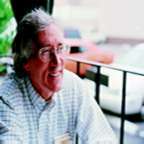
The tools of the trade are modest: A spiral notebook and a Bic pen. After that, it’s a lot of sitting. Thinking, waiting, remembering, hoping that a moment that made you giggle will at least make the tourists from Topeka grin.
It’s not like there’s a magical funny well from which a comic can draw jokes like water. If there is, could somebody please let Jim Brogan know? He’s been doing it the hard way for more than 25 years.
Brogan, a 1970 Notre Dame graduate, has been called the “funniest guy you’ve probably never heard of.” He’s done stand-up everywhere, even starred in his own sitcom for a nanosecond. He is also the man who has helped select and sharpen Jay Leno’s Tonight Show monologue every night for the last eight years — a job that has earned Brogan the ill-fitting title of L.A.’s premier “joke scientist.”
Comedy isn’t science. It’s a lanky 51 year-old guy in jeans and glasses talking about the tuna fish sandwiches his mom packed him as a kid. It’s Brogan poking fun at his Catholicism and the fact that — despite a fat Hollywood paycheck and scads of famous friends — he’s still kind of an oddball.
Brogan’s comedy is much like his friend Jerry Seinfeld’s, which is to say that both men are storytellers who delight in sharing the absurdities of life night after night with a crowd of two-drink-minimum strangers.
Unlike many of his contemporaries, Brogan doesn’t swear on stage. “We call that ’humor helper,’” he sniffs, “relying on language to pump a weak joke up. In the long run, that really limits what you can do.”
In Brogan’s world of wonderfully wacky observations, there are no limits. He writes jokes about putting his hand down garbage disposal and worrying that he might “flip out and turn on the switch.” He admits that while he still shops at Payless Shoes, “I’d rather pay more.”
Much of the time, he’s making it up as he goes along, improvising with his audience in a form of pure, interactive entertainment you’ll never find staring at a computer screen.
Brogan: So, what do you do for a living?
Audience Member: Nothing.
Brogan: That’s nice, but how do you know when you’re done?
Brogan found humor in a strange place. The summer before his senior year at Notre Dame, he dropped out of Army ROTC — in part out of fear of being sent to Vietnam. Seeking a release from the stress of his decision, he read Enjoyment of Laughter. In the book was a chapter about academics who studied humor and babies.
“What they found was: You had to smile, so they knew you weren’t threatening. Then you hold something out, the baby reaches for it, and then you take it away. That made them laugh,” Brogan recalls.
It’s no different in front of a roomful of grown-ups at the Improv in New York, The Comedy Underground in Seattle or Snickerz in Fort Wayne, Indiana.
“You’re friendly to the audience. You hold something out for them, they reach for it, and then you take it away,” Brogan explains. “That’s the closest thing to defining comedy that I can think of.”
The opposite of comedy? It’s excruciating, humiliating personal agony, if you wrote the joke that bombs. If someone else did, well, it’s still painful and embarrassing, but at least it’s not entirely your fault.
“I once did a television pilot about driving around the streets of Los Angeles in a tank,” Brogan recalls. “They thought it would be so hilarious. We went through the drive-through at Burger King. No one paid any attention. It didn’t seem to be that funny.”
Being funny for a living is still a job. Brogan works the Tonight Show gig from 2 p.m. through dinnertime. He performs stand-up three or four times a week between 7 p.m. and 10 p.m. Every night from 10:30 p.m. on, Brogan is perched on Leno’s couch, dissecting hundreds of jokes, contenders for the next night’s monologue.
The later they go, the more risks they take. The joke about the radioactive goat on the loose in New Mexico seemed hilarious to Leno and Brogan one morning at 5:30 a.m. Of course, it tanked on TV.
The routine, the repetition — it isn’t so different from a lawyer filing briefs or a teacher following a lesson plan. Except, of course, for the bright lights, big smiles and thunderous applause that come at the end of Brogan’s work day.
“When you find a joke that works, it’s such a difficult nugget to have mined out of a huge mound of dirt. You created it, you wrote it, you tried it on stage and it worked. It’s a delight, it’s joy,” he confides.
“But to me, it’s mostly relief — relief that what I thought was funny actually is.”